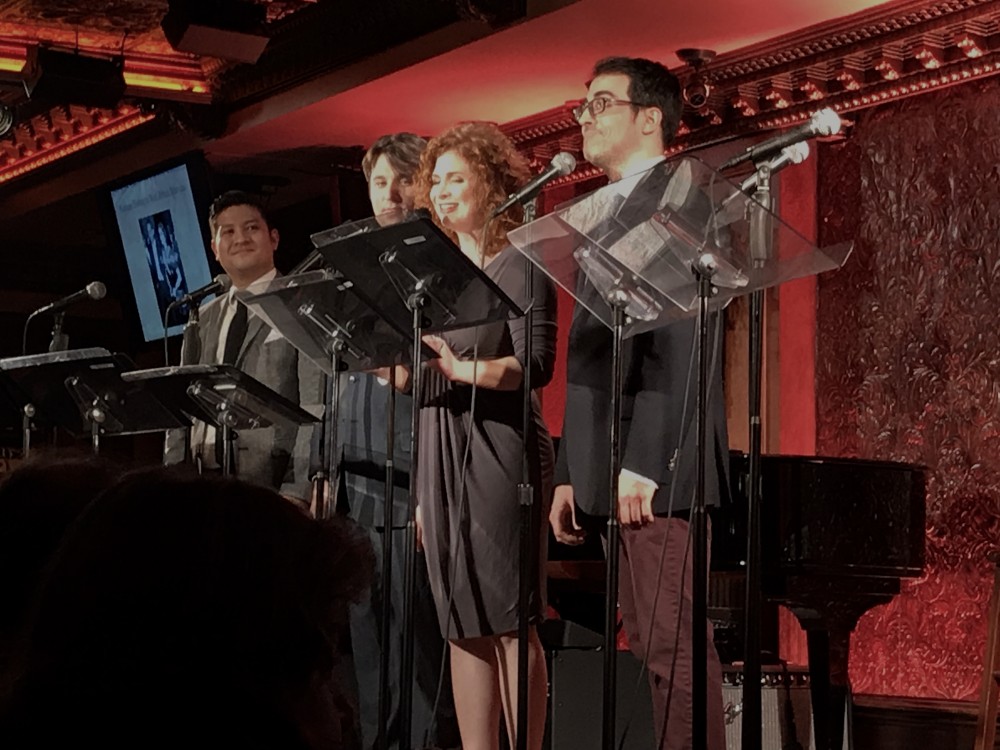By Ron Fassler
The musical revue was a staple of Broadway (then later off-Broadway) from the early part of the 20th century and on into the 1950s. As time marched on, such revues became a rarer and rarer thing (though occasionally some broke through that were hugely successful, such as 1978’s Ain’t Misbehavin’ or 1995’s Smokey Joe’s Cafe). But for all intents and purposes, revues like Irving Berlin and Moss Hart’s 1933 hit As Thousands Cheer, have long been gone from the scene. But what a hit it was! At nearly 400 performances, it was one of the longest running musicals of 1930s.
What made the Berlin-Hart revue so unique was that it was one of the very first (if not the first) to take its themes off headlines in the news. Titles such as “World’s Wealthiest Man Celebrates 94th Birthday” were projected on screens to set up the song to come. Frankly, not all that different a set-up from the sketches seen weekly over the last five decades on Saturday Night Live. But whereas SNL is jokey, with only on rare occasions going anywhere near deep, thoughtful places (think after 9/11 or the shooting tragedy at Parkland High School), As Thousands Cheer was both comical and tragic. Its gutsiness was praised in an opening night review by the critic John Mason Brown, who wrote that “America is still the land of the free… and… the Music Box continues to be the home of the brave.”
Last evening, and for one performance only, a young troupe of actor-singers produced a staged reading of this venerable musical revue in a tightened version, running just fifty-three minutes. Directed affectionately by Justin Schwartz, and with able music direction by Eugene Gwozdz, it certainly would have benefited from more rehearsal, in that in an ideal world, the monumental “Suppertime” would have been fully memorized by the performer, in this case Andrea Fleming, so she could fully let loose with the song’s true power. That said, this was an energetic, fully committed company, who in addition to Ms. Fleming, included Dana Aber, Jennifer Apple, Lindsay Fabes, Sheldon Gamabon, Zachary Spiegel and Eric Stephenson. Though I was familiar with none of them, it’s a pleasure to report they all possessed strong and clear voices. And if the comedy playing of some of Hart’s sketches didn’t quite land, this had more to do with their being read from scripts at music stands. Still, by including the sketches, it allowed for the audience to get a feel for what As Thousands Cheer might have been like as a stage production, as opposed to just a night of songs.
As it rightly should have, the evening belonged to Irving Berlin, who has long been established as one of the leading lights of 20th century music, and for good reason. Not only does this revue have a challengingly musically diverse score, but it is all the more remarkable coming from the pen of this Russian-born immigrant, who arrived in New York in 1893 without speaking a word of English, yet was still capable of highly deft and witty lyrics. No less an expert than Stephen Sondheim has weighed in on the man, writing that “Berlin knows how to inflect words melodically and rhythmically so that they seem to flow organically; the listener is rarely aware of the songwriter.” Evidence of this was on view last night, with songs like “Heat Wave,” “Easter Parade” and “Harlem on My Mind,” in addition to the emotionally wrought “Suppertime.” What made this song so extraordinary, was that when it was showcased by the immortal Ethel Waters in its original production, it was preceded by a headline that read: “Unknown Negro Lynched by Frenzied Mob.” Waters lament was then sung while setting the table, fully cognizant this meal would include sitting her children down to tell them what happened to their father. It’s an absolutely devastating song, and one you might think would have been excised from a frothy musical revue like As Thousands Cheer in 1933. But such were the power of Hart and Berlin at the time, matched by the support they got from their producer Sam H. Harris, that the song stayed.
That’s the kind of show it was, and those fortunate enough to attend Feinstein’s/54 Below last night (November 13) got a chance to experience it in all its glory.
Photo: Ron Fassler



















